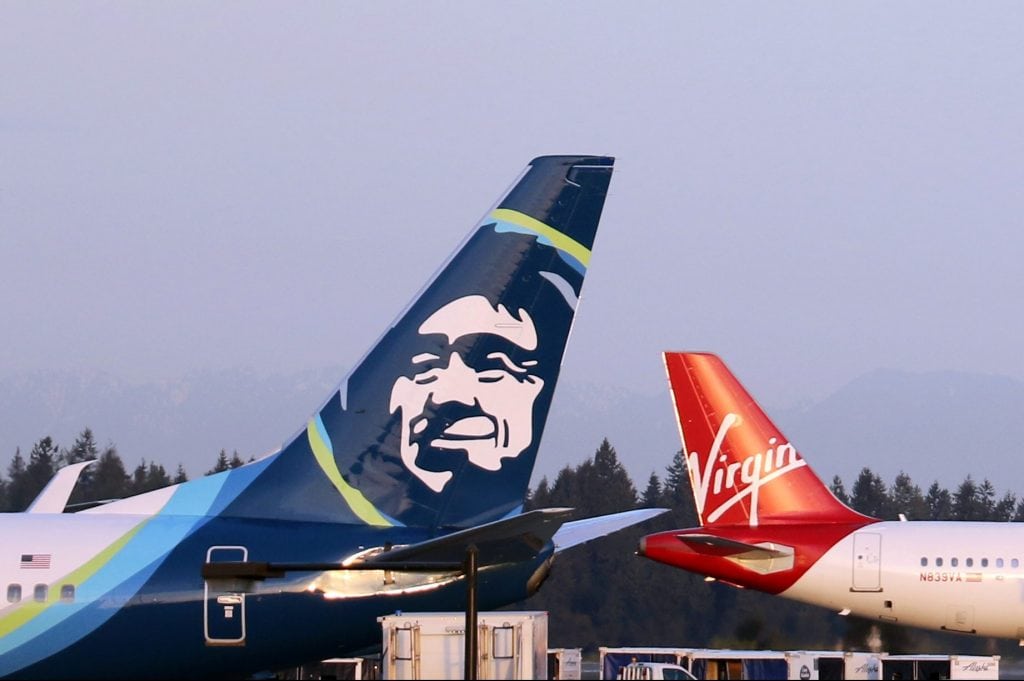Skift Take
Yes, Alaska paid a fortune for Virgin America. But that doesn't mean it is a bad deal. Alaska believes it needs Virgin America's assets to compete and grow.
Virgin America is going out with a whimper.
The nine-year-old carrier quietly reported second quarter earnings on August 5, and while it is still making money, there are several signs business is not as strong as it once was.
Net income fell to $38.1 million, down from almost $65 million during the same period last year. Passenger revenue per available seat mile, a closely watched industry metric measuring how much an airline makes for each mile it flies, fell 9 percent, year-over-year. Operating margin decreased 0.7 points to 16.2 percent.
Virgin America’s earnings announcement, made in a U.S. Securities and Exchange Commission filing, rather than a press release, came as Alaska Airlines seeks final approval for its acquisition of the small, California-based airline. Alaska is hopeful its deal, announced in April, will close by year-end.
According to Virgin America’s filing, the two airlines have provided the U.S. Department of Justice with planned schedules, and are awaiting the results of the government’s investigation. Since the carriers overlap on only seven routes, they are optimistic they will receive clearance, Alaska’s general counsel said on his airline’s second quarter earnings call.
Alaska is buying Virgin America for $57 per share, a 47 precent premium to where the stock traded just three days before the announcement. That’s a steep price for a company with earnings like Virgin America, but Alaska calculated it needed to increase its footprint on the West Coast and with transcontinental flights to the New York and Washington, D.C. areas, and this was its best option. Acquiring Virgin America also helped Alaska block JetBlue, the most serious other contender, which also wanted to strengthen its West Coast operations.
“Yes, Alaska probably overpaid for Virgin America, whose shares we estimate are probably worth ~$25 on a standalone basis right now, less than half of what Alaska paid ($57) after a four-way bidding war,” Hunter Keay, an analyst at Wolfe Research, wrote in a August 8 report. “But it’s done and this deal seems very likely to close. At least Alaska will find itself with more things to fix.”
Alaska told investors that yields — which essentially measure how much travelers pay for tickets — have been “significantly reduced” in its core markets. The vast majority of the airline’s flights touch either San Francisco or Los Angeles. Still, Virgin America said it estimates it is performing no worse than its competitors, citing publicly available data.
But Keay calculated that Virgin America’s yield decreases are more of an issue than the airline suggests. He noted Virgin America’s yields dropped only 3.8 percent for the first quarter, on a year-over-year basis, but fell 9.7 percent on the second, also year-over-year. Other U.S. airlines also face yield pressures, Keay said, but their combined second quarter yields fell only about 6.1 percent, year-over-year, according to his calculations.
“It’s easy to see ball-dropping within the ranks of the pricing department at Virgin America as employees become distracted job hunters, especially if they view themselves as potential synergy targets or if they’re unwilling or unable to relocate,” Keay wrote. “It happens.”
In a note published after Alaska reported earnings on July 21 — its net income of $260 million was up $26 million year-over-year —Credit Suisse analyst Julie Yates concluded Alaska likely overpaid for Virgin America, but she she said the airline likely had little choice.
“Keeping JetBlue from acquiring Virgin America was a key consideration to prevent encroachment in Alaska’s network over time,” Yates said. “Alaska obtains valuable gates and landing slots on the East & West Coast … providing ALK a more robust platform for growth.”
The Daily Newsletter
Our daily coverage of the global travel industry. Written by editors and analysts from across Skift’s brands.
Have a confidential tip for Skift? Get in touch
Tags: alaska airlines, mergers and acquisitions, virgin america
Photo credit: Virgin America, which is being acquired by Alaska Airlines, is having revenue trouble. Pictured are Alaska and Virgin America aircraft. Alaska Airlines
